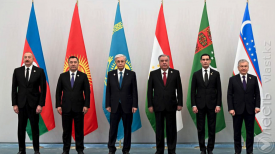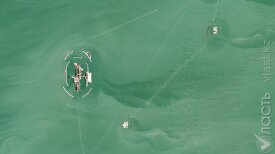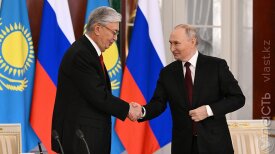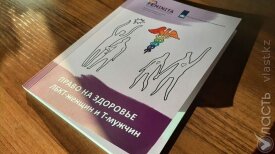The General Prosecutor’s Office confirmed on April 29 that former minister of internal affairs Yerlan Turgumbayev was detained for abuse of power. A special court in Astana confirmed on May 2 that he will be kept in pre-trial detention for two months. Former President Nursultan Nazarbayev appointed Turgumbayev as minister of internal affairs in February 2019, just before resigning. Turgumbayev received strong criticism for his role during the repression of country-wide protests in January 2022, known in Kazakh as ‘Qandy Qantar’.
Finance minister Madi Takiyev told President Kassym-Jomart Tokayev that budget spending will shrink by around 300 billion tenge ($680 million) this year. At a meeting in the presidential palace on May 2, Takiyev said the government would direct the capital to activities “with maximum economic return.” Meanwhile, the Central Bank transferred around $1 billion in April alone from the National Fund to finance the budget.
Kazakhstan will charge Russia more for oil transit to China, according to amendments to bilateral agreements adopted by the Senate on May 2. While transit through Kazakhstan’s pipeline system will continue to be priced at $15 per ton of oil, the transit of oil through the northern city of Pavlodar, previously priced at $1 per ton, will now double to $2.1 per ton. This could increase Kazakhstan’s yearly income from the transit of approximately 10 million tons of Russian oil to China by around $140 million.
Water levels of the Zhaiyk river (Ural in Russian) have continued to increase, the state monitoring service Kazhydromet said on May 3. The Zhaiyk, which cuts through the West Kazakhstan and Atyrau regions, is said to be the last worrying hotspot for floods this season. Floods have hit several regions in Kazakhstan for 40 days now.
A court in Almaty held on May 2 the first hearings in a trial against journalist Jamilya Maricheva, accused of “spreading false information” through her ProTenge telegram channel. In January, she published a post in support of Radio Free Europe/Radio Liberty (RFE/RL) journalists in their quest to obtain accreditation. Askhat Niyazov, another journalist, faced trial for reposting to his channel ProTenge’s appeal for RFE/RL journalists, but the court dismissed his libel case on April 29.
Journalist Raul Uporov was fined on April 30 the equivalent of $168 for using obscene language during one of his live streams from the flooded areas near the north-western city of Uralsk. Police summoned Uporov and questioned him in what many saw as pressure against journalists. In their latest press freedom ranking, published on May 3, Reporters Without Borders showed that Kazakhstan has fared worse than the previous year, plunging to 142nd place out of 180 countries surveyed.
A former police chief in the southern city of Taldykorgan was sentenced to 11 years in prison on April 30 for rape. A bouncer at a bar in Almaty was sentenced to eight years in prison for rape and robbery on April 29. Both were detained in separate occasions last November, days after the death of Saltanat Nukenova, the wife of former economy minister Kuandyk Bishimbayev who is now facing trial for murder. The high-profile case against the former minister has led to an increase of arrests and trials for rape and domestic violence cases.
Badgat Musin, who served as minister of digital development, resigned on April 30. A message from the presidential press service said that Musin had been relieved of his post, but did not announce a replacement. Musin was appointed in 2020.
Поддержите журналистику, которой доверяют.








